

Blog. I am not a US citizen, so I can’t officially react to the latest news from the US patient access front nor put my opinion on the “protest page“.
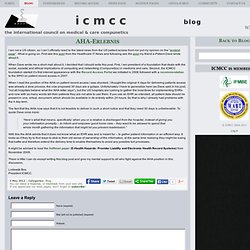
What is going on. First see this post from the Healthcare IT News and following see the post my friend e-Patient Dave wrote about it. When Dave wrote me a short mail about it, I decided that I should write this post. First, I am president of a foundation that deals with the social, societal and ethical implications of computing and networking (Compunetics) in medicine and care.
Second, the ICMCC foundation started it’s first internet appearance with the Record Access Portal we initiated in 2006 followed with a recommendation to the WHO on patient record access in 2007. When I read the position of the AHA on patient record access I was shocked. The fact that the AHA now says that it is not feasible to deliver in such a short notice and that they need 30 days is unbelievable. Greenway Integrates PrimeSUITE Patient Data with Microsoft HealthVault. Greenway Medical Technologies, Inc., today announced pilot integration of Microsoft HealthVault data aggregation and mobility to providers utilizing the company’s electronic health record (EHR), practice management and interoperability solution PrimeSUITE®.
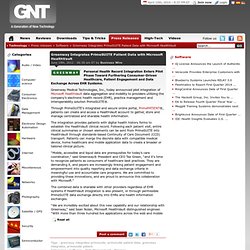
Through PrimeSUITE’s integrated and secure online portal, PrimePATIENT®, patients can create and access a HealthVault account to gather, store and manage centralized and sharable health information. The integration provides patients with digital health history forms to establish the HealthVault clinical record. Following each patient visit, entire clinical summaries or chosen elements can be sent from PrimeSUITE into HealthVault through standards-based Continuity of Care Document (CCD) transport. Patients can merge the discrete data with compatible medical device, home healthcare and mobile application data to create a broader or tailored clinical picture. How a Broken Medical System Killed Google Health. Google Health going out with a whimper. Three years of public availability without Google Health catching fire is enough for the search engine giant.
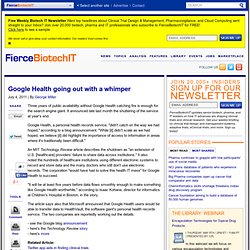
It announced late last month the shuttering of the service at year's end. Google Health's demise spells trouble for 'untethered' PHRs. Google's decision to pull the plug on its Google Health platform, effective Jan. 1, 2012, is not unexpected.
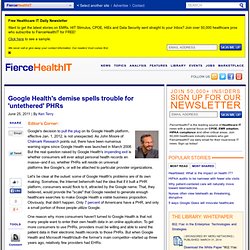
As John Moore of Chilmark Research points out, there have been numerous warning signs since Google Health was launched in March 2008. But the real question raised by Google Health's impending exit is whether consumers will ever adopt personal health records en masse--and if so, whether PHRs will reside on universal platforms like Google's, or will be attached to particular provider organizations. Let's be clear at the outset: some of Google Health's problems are of its own making. Somehow, the Internet behemoth had the idea that if it built a PHR platform, consumers would flock to it, attracted by the Google name.
Fred Trotter » Blog Archive » Google Health is dead, HealthVault Indivo win. Recently, Google announce that the Google Health PHR will be retiring.
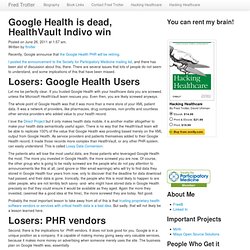
I posted the announcement to the Society for Participatory Medicine mailing list, and there has been alot of discussion about this, there. There are several issues that lots of people do not seem to understand, and some implications of this that have been missed. Let me be perfectly clear. If you trusted Google Health with your healthcare data you are screwed, unless the Microsoft HealthVault team rescues you. Even then, you are likely screwed anyways. The whole point of Google Health was that it was more than a mere store of your XML patient data. I love the Direct Project but it only makes health data mobile, it is another matter altogether to make your health data semantically useful again. The patients who will lose the most useful data, are those patients who leveraged Google Health the most. Second, there is the implications for PHR vendors. Your average PHR company cannot make that kind of play. Google Health - Too Early for iPatients? Few are surprised by this NY Times headline – Google to End Health Records Service After It Fails to Attract Users.
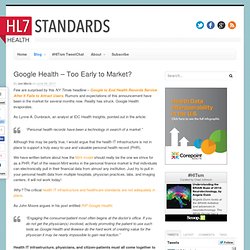
Rumors and expectations of this announcement have been in the market for several months now. An update on Google Health and Google PowerMeter. In the coming months, we’re going to retire two products that didn’t catch on the way we would have hoped, but did serve as influential models: Google Health (retiring January 1, 2012; data available for download through January 1, 2013) and Google PowerMeter (retiring September 16, 2011).
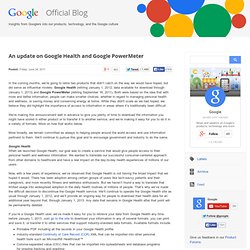
Both were based on the idea that with more and better information, people can make smarter choices, whether in regard to managing personal health and wellness, or saving money and conserving energy at home. While they didn't scale as we had hoped, we believe they did highlight the importance of access to information in areas where it’s traditionally been difficult. We’re making this announcement well in advance to give you plenty of time to download the information you might have stored in either product or to transfer it to another service, and we’re making it easy for you to do it in a variety of formats. More on how that works below. PHRs – T.P. Caruso & Associates* Aetna Taps Healthline For Patient Portal. Insurers and healthcare providers are increasingly using Web portals to comply with meaningful use, give patients ready access to medical data and other relevant information.
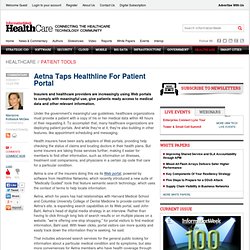
Under the government's meaningful use guidelines, healthcare organizations must provide a patient with a copy of his or her medical data within 48 hours of their requesting it. To accomplish that, many healthcare organizations are deploying patient portals. And while they're at it, they're also building in other features, like appointment scheduling and messaging. Health insurers have been early adopters of Web portals, providing help checking the status of claims and locating doctors in their health plans.